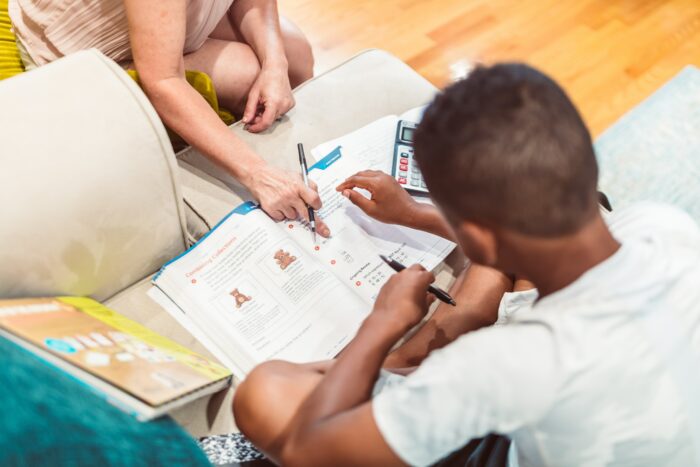
If you’ve been a parent for even a short amount of time, you have probably realized teaching selfless behavior is one of the most important things you can do, yet also one of your biggest challenges.
It’s pretty easy to see that we’re fighting the culture upstream when we strive to uphold responsibility, accountability, and integrity as values we expect from our kids.
Our modern society is one of selfies and indulgence. So many conveniences that were meant to make our lives easier have done just that- they’ve made our lives easier.
Which, unfortunately, has caused people to devalue the concept of hard work and expect to have everything at their fingertips. It has also produced generations of children who feel entitled.
So, how do we raise compassionate, responsible kids rather than self-centered, entitled ones? It takes some intentional steps to get there, and a lot of following through, but it can be done and it’s absolutely worth it!

1. Give Them Basic Tasks
Here’s a little secret I’ve learned over the last 13 years of parenting: you really don’t have to do everything for your kids! With a little instruction and guidance from you, you’ll realize they are more than capable (and eager) to do things for themselves.
One way you can pass off some responsibility is to have them start fixing simple lunches and snacks. By the time they were 5 or 6, my kids were making their own peanut butter sandwiches and grabbing something to snack on.
You can set some ground rules like using one-cup containers so that they learn to eat reasonable portions – and they don’t wipe out an entire box of snacks in one sitting!
Another way to pass off responsibility is for your kids to clean up after themselves. Get your kids in a habit of bringing their dishes to the sink, throwing away their own trash, and cleaning up their own spills.
Even toddlers can get on board with a little practice! If they’ve already been doing this, you can step it up a level and teach them how to load the dishwasher. Even if you have to rearrange the dishes a bit afterwards, it’s a great skill for kids to learn.
You can also have them keep their rooms neat and tidy. It’s really up to you how “clean” you expect your kids’ bedrooms to be.
But it’s never too early to teach them that what they get out, must be put away. Even if it’s not totally clean by your standards, at least it can be hazard-free.

2. Establish Clear Boundaries Between Your Responsibilities and Theirs
We hear about boundaries all the time and how important they are to any relationship, but most of us struggle maintaining them with our children.
Something I’ve had to be intentional about is not constantly picking up after my kids and putting that chore back on their shoulders instead. Things like putting away toys and shoes, bringing their stuff in from the car, and emptying lunchboxes are very easy tasks they should be expected do themselves.
As parents we tend to think it’s really no big deal, for instance, to put away backpacks or shoes that have been carelessly left by the door, but by doing this we inadvertently teach our children to be lazy.
Homework is also another area where a lot of parents get sucked into taking on more responsibility than is actually theirs. It doesn’t have to be this way!
Set clear expectations for homework, such as it will be started right after school and completed before dinner is ready. This way your children aren’t suddenly “remembering” they have homework to do right before bed.
You could have something like office hours where the kids can ask you questions for 30 minutes (or however long you want to devote). After that, they’re on their own.
And don’t bring forgotten homework assignments to school! Being caught empty-handed with that project or assignment which was left on the counter just one time is usually enough for kids to make sure they never forget schoolwork again.

3. Don’t Give Warnings Or Reminders
By nagging and lecturing your kids about their responsibilities, you’re essentially saying that they’re not smart enough or capable enough to follow through. And that doesn’t motivate them to get the job done.
Instead, make it clear what your child needs to do- and enforce consequences when it’s not done or when the behavior doesn’t meet the standard that’s already set.
With constant reminding, you’re still doing all the work rather than having them take ownership. Natural consequences (the kind they’ll face in the real world) are much more effective in teaching the lesson and cultivating responsibility long-term. Just like with the forgotten homework.
If you assign chores beyond their regular responsibilities, for example Saturday morning chores where everyone is required to pitch in, set a reasonable time frame and hold them to it.
Again, you don’t have to say anything after that- no reminders are needed. But when that time comes, decide what the consequence will be if the job is ignored.
If they have plans to go out with friends and totally shirked their chore, guess what? They can go next time.
4. Teach Them To Serve
Have you ever thought about how God created our hearts to serve? A simple act of service does not go unnoticed by our Maker.
When we learn to take our eyes off of ourselves in order to help those around us, we can’t help but discover joy in the process.
Do you remember when Jesus washed his disciples feet? He chose to humbly serve them in this way to demonstrate the importance of placing others before ourselves.
We are not here to please ourselves. We are here to bring glory to our Creator and lovingly serve those He has placed in our lives.
Teaching our children how to serve doesn’t have to be complicated. We can show our young children how to set the table and help prepare dinner for the rest of the family.
Elementary age children can help their younger sibling with something they’re struggling with. Or take the time to play with them when they would prefer to do something else. Older children can run errands for an elderly neighbor or mow their grass.
It doesn’t have to be an elaborate gesture in order for them to learn the importance of (and blessings that stem from) putting others before themselves!

5. Discipline Wrong Behavior
We’ve been given an extraordinary task in caring for the children God has placed in our care. Our kids, just like the rest of us, are born into sin and need consistent guidance to learn right from wrong.
Taking the easy way out and turning a blind eye to their disobedience doesn’t do them any favors. They need to appreciate that their actions have consequences, and that these actions also impact other people.
Though it may feel like we’re being “mean”, the reality is that the world does not revolve around our kids. We must consistently and lovingly correct their misbehavior over and over again, so they learn to be held accountable.
6. Limit TV and Electronics Usage
I’ve noticed a direct correlation between the amount of screen time my children have to the frequency of them acting out and not using their imaginations as often. If you think about it, this makes perfect sense.
Allowing our children to constantly use electronics only creates within them the desire and expectation for being entertained. This leads to impulsiveness and a lack of creativity when they’re not in front of screens.
It’s more than okay to let them be bored sometimes!
Limiting their usage of these devices can do a world of good for our children in teaching them to delay gratification and appreciate what truly matters.

7. Foster Gratitude
Grateful kids aren’t entitled. The good news is there are simple approaches you can use to foster gratitude in children authentically.
First, model it. Be open and share what you feel grateful for (out loud). We’re not necessarily talking about big life-changing moments or gestures. Regular everyday moments of gratitude can be powerful, are illustrative, and they add up.
You don’t even have to use the word gratitude — share how you feel in a way your kids can relate to, for example:
- I’m so thankful Grandma could help us out today, it made things so much easier!
- Isn’t it great we can all have dinner together?
- I’m so pleased we have sunny weather today. I can’t wait to get outside and feel some sunshine.
Another way to foster gratitude is to introduce a regular habit which encourages thankfulness in day-to-day life.
For instance, you can go around the table at dinnertime and have each person share three good moments from their day. It can be a moment that left them feeling joyful, amazed them, or made them laugh.
Or, while you’re all outside play a simple game that helps your children take notice of the beauty in God’s creation and the wonder in the little things around them.
Mix up an otherwise ordinary afternoon by telling them to “find three neat things in the garden”, “locate a beautiful flower or a cool insect”, or “spot fun cloud shapes”.

The task of raising responsible, thankful children instead of entitled ones is always a work in progress.
It takes time and effort to establish habits that build a good work ethic and sense of appreciation, but in the end it’s all worth it!
Eventually you’ll have young adults that are dependable, patient, and respectful, who acknowledge their own mistakes.

Leave a Reply
You must be logged in to post a comment.